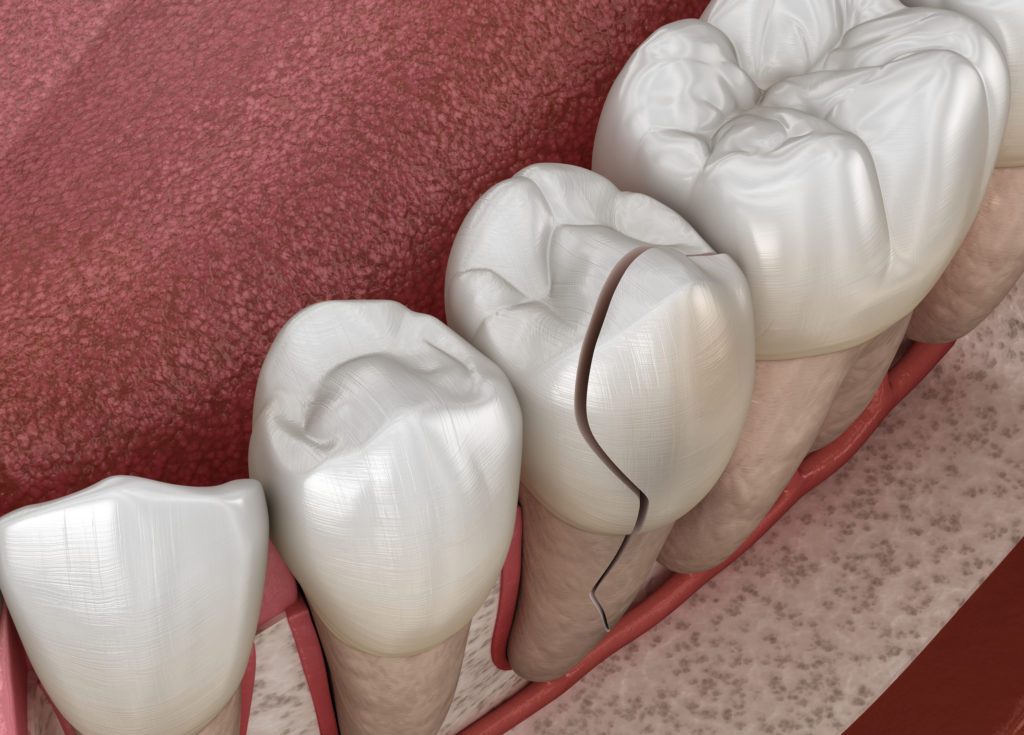A Cracked Tooth Doesn’t Need to Ruin Your Smile

As a Gresham general dentist, Dr. Jeremy Archibald knows firsthand just how uncomfortable the idea of cracked or broken teeth can make patients feel. Most people appreciate their ability to eat and drink without experiencing any type of discomfort, so the idea of cracking a tooth can be especially cringe worthy.
With something as serious sounding as a cracked tooth, most patient assume they will easily know if or when they crack a tooth. However, depending on the size and location of the crack, you may not even realize that something has gone wrong until a more serious problem, such as a break, occurs.
Since nobody should need to see a Gresham general dentist because of a surprise crack in their tooth during the holidays, let’s take a look at what you need to know about cracked teeth.
How to Know if You’ve Cracked a Tooth
Even though your teeth rank as some of the strongest and most resilient parts of the body, years of stress and strain can weaken them to the point where a crack becomes possible. Teeth can crack for a variety of reasons. Everything from a sports injury to biting down on a popcorn kernel to munching on ice can create the type of situation where a crack occurs.
When cracks do develop they may be large enough to notice or small enough to avoid detection. Depending on the size of the crack, you may or may not notice any type of discomfort when eating. It really just depends.
If you feel a pang of discomfort when chewing or a sharp bite when drinking something very hot or cold, that could be a sign of cracked tooth, especially if the discomfort comes on suddenly. Experiencing some pain eating dinner the night after you took an elbow to the jaw while playing a game of pick-up basketball is a pretty obvious sign that something may have happened that a Gresham general dentist needs to examine.
A cracked tooth causes you discomfort because the crack exposes the delicate roots and nerves of your tooth that normally sit protected beneath enamel. When hot or cold stimuli enter the base of your teeth, that can irritate the nerve and cause you to feel pain. Biting down on a cracked tooth places additional strain on the unstable structure, which can also irritate the nerves inside.
If a cracked tooth is left untreated, the pulp can become infected. Once this happens, the long-term health of the tooth is at risk and a root canal may be needed to save the tooth. Fortunately, early examination and treatment may be able to prevent permanent damage from occurring.
The Different Types of Cracked Teeth
A tooth can crack in a variety of different ways that include:
- Craze lines. These appear as shallow cracks that don’t pose any risk to the health of the tooth and only need cosmetic treatments. Craze lines are actually fairly common for adult teeth to develop.
- Deep crack. Once a crack moves below the exposed surface of a tooth and into the root, no form of treatment can correct the issue. The tooth will need to be extracted. Fortunately, early detection and the placement of a dental crown may help prevent the need for extraction.
- Fractured cusp. A break that occurs near a filling where the enamel has worn down. This type of crack can be fixed with the use of a replacement filling or crown.
- Split tooth. This is the type of crack that develops once a tooth has been damaged and doesn’t receive any kind of treatment. Dr. Archibald will need to examine the tooth to determine whether it can be saved.
- Root fracture. Occasionally the root of a tooth becomes cracked below the surface. This type of crack becomes noticeable only when the gums and bone near the tooth experience the effects of tooth decay. Oral surgery can help to save the tooth and repair the damage.
If you experience any discomfort when eating or drinking, don’t wait until the new year to have the problem examined. Delaying treatment can give the problem time to become worse.
A cracked tooth doesn’t have to ruin your holiday. Dr. Archibald and his team can quickly restore a tooth damaged by decay or trauma back to health.
